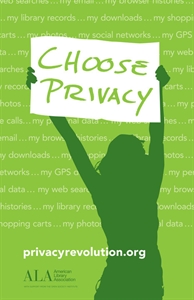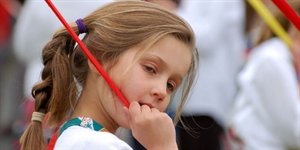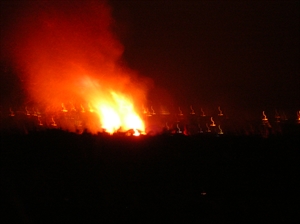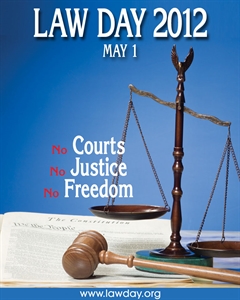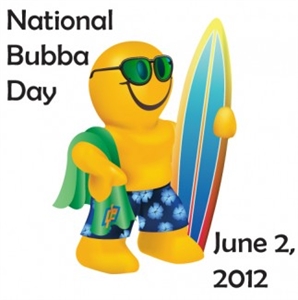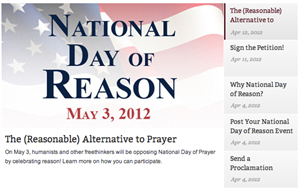National Day of Prayer 2024 is on Wednesday, May 1, 2024: Obama Ignores Prayer Day?
Wednesday, May 1, 2024 is National Day of Prayer 2024. The National Day of Prayer (36 U.S.C. § 119) is an annual day of observance held on the first Thursday of May, designated by the United States Congress, when people are asked "to turn to God in prayer and meditation".
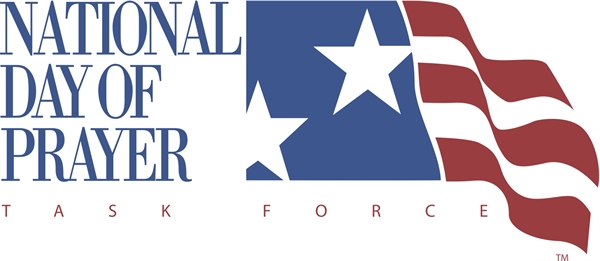
The National Day of Prayer (36 U.S.C. § 119) is an annual day of observance held on the first Thursday of May, designated by the United States Congress, when people are asked "to turn to God in prayer and meditation".
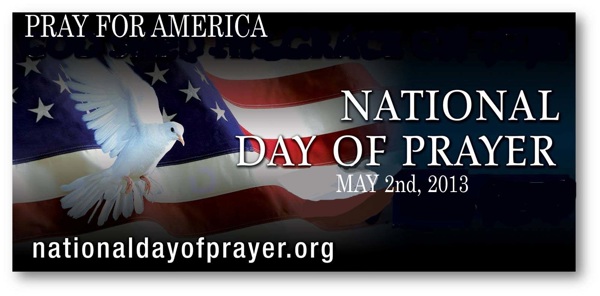
The National Day of Prayer Task Force (NDP Task Force) is an American evangelical conservative Christian non-profit organization which organizes, coordinates, and presides over Evangelical Christian religious observances each year on the National Day of Prayer.
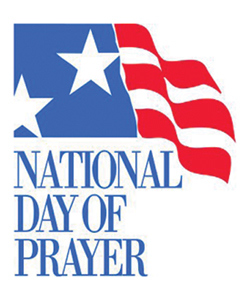
While the current National Day of Prayer has been around since the 50's, Bush is the only President who ever held the official event at the White House or attended it.
Obama did not ignore it. He is holding his own observance in the White House, just not attending the one that is organized by and sponsored by the National Prayer Day Committee, an evangelical Christian organization. He issued this proclamation:
NATIONAL DAY OF PRAYER, 2009
- - - - - - -
BY THE PRESIDENT OF THE UNITED STATES OF AMERICA
A PROCLAMATION
Throughout our Nation's history, Americans have come together in moments of great challenge and uncertainty to humble themselves in prayer. In 1775, as the Continental Congress began the task of forging a new Nation, colonists were asked to observe a day of quiet humiliation and prayer. Almost a century later, as the flames of the Civil War burned from north to south, President Lincoln and the Congress once again asked the American people to pray as the fate of their Nation hung in the balance.
It is in that spirit of unity and reflection that we once again designate the first Thursday in May as the National Day of Prayer. Let us remember those who came before us, and let us each give thanks for the courage and compassion shown by so many in this country and around the world.
On this day of unity and prayer, let us also honor the service and sacrifice of the men and women of the United States Armed Forces. We celebrate their commitment to uphold our highest ideals, and we recognize that it is because of them that we continue to live in a Nation where people of all faiths can worship or not worship according to the dictates of their conscience.
Let us also use this day to come together in a moment of peace and goodwill. Our world grows smaller by the day, and our varied beliefs can bring us together to feed the hungry and comfort the afflicted; to make peace where there is strife; and to lift up those who have fallen on hard times. As we observe this day of prayer, we remember the one law that binds all great religions together: the Golden Rule, and its call to love one another; to understand one another; and to treat with dignity and respect those with whom we share a brief moment on this Earth.
The Congress, by Public Law 100-307, as amended, has called on the President to issue each year a proclamation designating the first Thursday in May as a "National Day of Prayer."
NOW, THEREFORE, I, BARACK OBAMA, President of the United States of America, do hereby proclaim May 7, 2009, as a National Day of Prayer. I call upon Americans to pray in thanksgiving for our freedoms and blessings and to ask for God's continued guidance, grace, and protection for this land that we love.
IN WITNESS WHEREOF, I have hereunto set my hand this seventh day of May, in the year of our Lord two thousand nine, and of the Independence of the United States of America the two hundred and thirty-third.
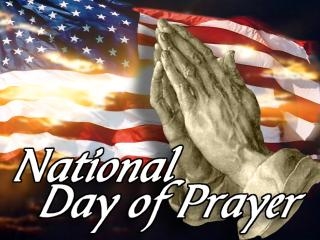
What day is the 'National Day of Prayer'?
Judge rules National Day of Prayer unconstitutional
Apr. 17, 2010
By Catholic News Service
Politics
Printer-friendly version
Send to friend
PDF versionWASHINGTON -- Despite a Wisconsin federal judge's ruling that the National Day of Prayer is unconstitutional, this year's observance of the day will go forward just as it has since 1953.
The White House said the ruling does not affect plans by President Barack Obama to issue a proclamation for the day, May 6, as mandated by law.
U.S. District Judge Barbara B. Crabb in Madison, Wis., said in an April 15 ruling that the federal law designating the day and requiring a presidential proclamation for the day violates the First Amendment prohibition against laws respecting an establishment of religion.
However, she postponed enforcement of the decision until all appeals are exhausted.
The U.S. Department of Justice said it was reviewing the ruling before deciding whether to file an appeal.
The day was challenged by Madison-based Freedom From Religion Foundation.
Archbishop Jerome E. Listecki of Milwaukee, who has often criticized the "religion of secularism," told the Milwaukee Journal-Sentinel daily newspaper that the ruling was a "missed opportunity to acknowledge our nation's identity, which was founded on our dependence on God."
The roots of the National Day of Prayer can be traced to 1952 when the Rev. Billy Graham led a rally in Washington during which he called for a special day to be set aside for Americans to pray and meditate so that the country would experience a "great spiritual awakening."
Legislation authorizing the day was introduced in the U.S. House the next day and later in the Senate and was quickly passed. President Harry Truman signed the first National Prayer Day proclamation in 1953. President Ronald Reagan made it a permanent event. In 1988, Congress enacted legislation requiring the president to issue an annual proclamation.
Starting in 2001, President George W. Bush annually hosted a high-profile event to mark the day in the East Room of the White House. It was attended by numerous religious and political figures.
In 2009, President Barack Obama issued a proclamation for the day, but did not host a prayer service at the White House. The decision was criticized by Republicans and some religious leaders.
The Freedom From Religion Foundation filed its lawsuit against government officials in October 2008.
The group argued the day violated the separation of church and state because it said that government officials, in observing it, too often adopted the religious perspective of the National Day of Prayer Task Force, based at the headquarters of Focus on the Family, a Christian advocacy group based in Colorado Springs, Colo.
The ruling does not affect the National Prayer Breakfast, traditionally held in Washington on the first Thursday of February and organized by a private organization. Presidents and various religious, political, and celebrity figures have addressed the gathering.
The National Catholic Prayer Breakfast, a separate event usually held in Washington in mid-April, also is not affected by the ruling. The 2010 event has been postponed until September, according to the event's Web site.
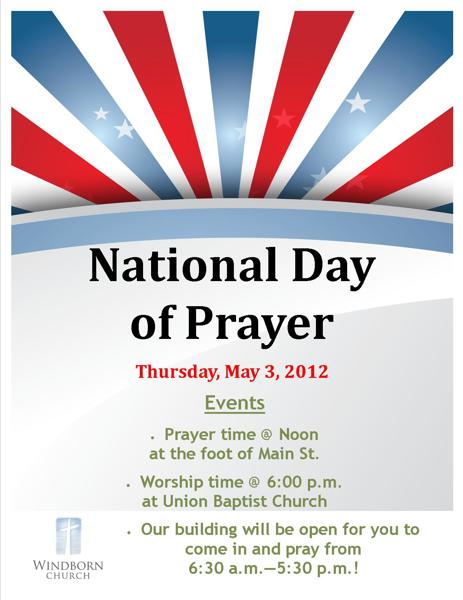
Who invited Franklin Graham to pray @ National Day of Prayer and then who is responsible for dis-inviting him?
The National Day of Prayer is most definitely a Christian holiday. It was started by Christians.
The evidence of that is that the National Day of Prayer does not have to be governmentally endorsed in order for Christians to take that day out for prayer. Also, if you will look at last year's National Day of Prayer, you'll find that Barack Obama unsuccessfully tried to cancel it based on the fact that he didn't want the Muslim nations to think America was Christian. As a Christian, I still prayed on the National Day of Prayer, whether it was canceled by the president or not.
It's really interesting that, to Barack Obama, it is far worse to be considered a Christian nation in the Middle East than it is considered bad to be an infidel and a traitor to the Muslim religion. I don't quite understand that.
But to sum up, the National Day of Prayer (from my remembrance) was originated by Christians praying and then some politicians in an attempt to usurp some sort of clout or prestige, started adopting it until it became a recognized Christian holiday.
From my understanding, there are definitely Muslims in the military. The last Muslim that I heard about in the military went on jihad and killed I think five people, injuring nine, at Fort Hood. And as I recall he was even an officer (but my facts could be wrong). As far as a Muslim in Congress, I know that our president has waffled back and forth as to whether he's a Muslim or not. But I know he's definitely a Christian-hater.

